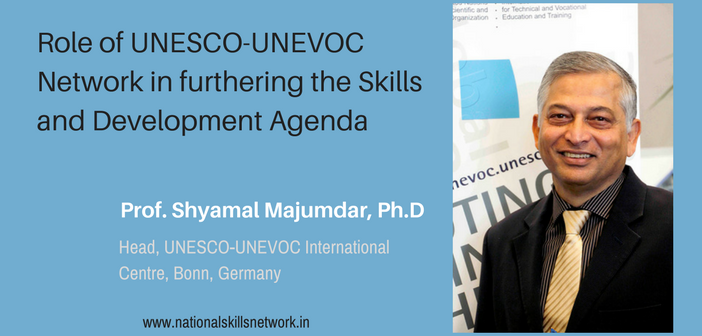The UNEVOC Network has been playing a key role in facilitating vocational training and skill development in more than 170 centers in UNEVOC countries. In this article, Prof. Shyamal Majumdar, Ph.D, Head of UNESCO-UNEVOC International Centre, Bonn, Germany, discusses the mandate and activities of this international institution and how they are responsible for realizing the Sustainable Development Goals (SDGs) in the area of skill development.
Introduction
UNESCO-UNEVOC International Centre (UNESCO-UNEVOC) is UNESCO’s specialized centre for Technical and Vocational Education and Training (TVET) and functions as the hub of the UNEVOC Network. The UNEVOC Network is a network of leading TVET Institutions in UNESCO’s Member States. There are more than 200 UNEVOC Centres in 170 countries. It is a unique platform for UNESCO to pursue its integrated approach to further mainstream South-South and North-South-South cooperation in TVET. Network has a global outreach consisting of very diverse TVET institutions with respect to their structures, responsibilities, and roles within the national TVET system. Ministries (22%), national bodies (22%), universities (28%) and training institutions (28%) are the types of member organizations within the Network.
In Germany, the Federal Institute of Vocational Education and Training (BIBB) and the Deutsche Gesellschaft für Internationale Zusammenarbeit (GIZ) GmbH host UNEVOC Centres. The UNEVOC Network spans across five regions: Africa, Asia and Pacific, Arab States, Europe and North America, and Latin America and the Caribbean. The Network aims to promote international cooperation among UNEVOC Centres worldwide and contribute to TVET reform in member states with the following three objectives:
- To improve TVET in member states by promoting and fostering international collaborations, partnerships and cooperation among TVET practitioners, civil society, local communities, researchers and policy-makers
- To develop the capacities of UNEVOC Centres and associated TVET practitioners by providing various forms of technical assistance; and
- To share promising practices and innovations in TVET, through the promotion of research and practised-based evidence.
The global context and the importance of UNEVOC Network
Our time is an era of transitions. This is also a time of turbulence as well as time of challenges. The challenges which threaten the economy, society and the environment are numerous, complex and interconnected. In spite of significant economic and social progress till date, high youth unemployment, social disparities and environmental degradations create challenges for all countries. These challenges threaten human security, dignity and social cohesion. Peace is fragile. Large number of people in this world still suffers from poverty, hunger and inequalities. Addressing such challenges needs integrated global developmental goals.
Global goals require universal solidarity, international dialogue and an inter-sectoral, interdisciplinary approach as expressed in the commitment made at the United Nations Sustainable Development Summit 2015, ‘Transforming our World: The 2030 Agenda for Sustainable Development’. Therefore, UN has adopted Sustainable Development Goals, a new vision for people, the planet, prosperity, peace and partnership.
The 2030 Agenda has 17 Sustainable Development Goals (SDGs), including SDG 4 which reads, ‘To ensure inclusive and equitable quality education and promote lifelong learning opportunities for all’. (cf. United Nations 2015). Seven targets has been set up for the SDG 4 and three targets are of special significance for TVET by 2030:
- Ensure equal access for all women and men to affordable and quality technical vocational education and training and tertiary education, including university
- Substantially increase the number of youth and adults who have relevant skills, including technical and vocational skills, for employment, decent jobs, entrepreneurship, societal participation and personal development
- Eliminate gender disparities in education and ensure equal access to all levels of education and vocational training for the vulnerable, including persons with disabilities, indigenous peoples and children in vulnerable situations.
Meeting these targets requires the transformation and expansion of TVET through economic, social and environmental dimensions. TVET has a central role in helping youth and adults to develop the skills they need for employment, decent work and entrepreneurship, to support the effectiveness of their organizations and the development of their life and communities. Therefore, skills development and TVET are in the top of countries’ policy agendas and at the centre stage of the international policy discourse. In fact, these have never been as important and timely as it is now. It is imperative to view this debate from a holistic, integrated and balanced way. Skills policy does not have merely economic dimension; it also has a social, technological and environmental dimensions contributing towards sustainability and lifelong learning. This is the reason why UNESCO-UNEVOC advocates for quality skills and in highlighting its transformation through sustainable and lifelong perspectives.
UNEVOC regions include countries with a wide range of sizes and characteristics. For instance, member states vary in demographics, income level, unemployment rates and risks in relation to climate change. The disparities in economic, social as well as environmental characteristics between countries and regions suggest a lot remain to be improved and shared when it comes to skills-based responses to the twin challenges of sustainable development and youth unemployment.
UNEVOC Network provides rich opportunities to collaborate in the areas of capacity development, knowledge development and/or knowledge management. Information and knowledge about different aspects of TVET are informed and cross-shared, thereby broadening the base for clarifying and creating common understanding of TVET issues, challenges, solutions and promising practices. UNESCO-UNEVOC facilitates knowledge sharing through: research and evidence-based studies; online communities, including the ‘TVeT-Forum’ (four virtual conference every year); the ‘UNEVOC Network Portal’, including a directory of all TVET member institutions featuring information on their events and activities; and ‘TVETipedia’ a glossary of terms that are commonly used globally in the area of TVET, providing definitions and background information. UNESCO-UNEVOC also engaged in developing ‘Promising Practices database’ and ‘the World TVET Database’, providing concise, reliable and up-to-date information on TVET systems worldwide.
Partnership and Networking as strategic resources
Sustainable development and the driving of economies for more jobs and inclusive growth underpin the key transformative shifts needed in education and training. TVET as a fertile ground for deepening inter-governmental and inter-sectoral cooperation frameworks that can mobilize expertise, resources and tie up common vision to create a transformative future.
The Network as a strategy for cooperation builds on local relevance and global impact. It performs as a clearinghouse of new ideas, a test bed of innovations and a platform for benchmarking in TVET. It captures issues to inform global debate, and derives back consolidated ideas to enrich country and institutional reform initiatives. Network members ideally need to be linked to local/national TVET agenda and reforms to be full-fledged players in a global network.
In this dynamic and challenging context, peer-to-peer knowledge sharing and networking between and among TVET stakeholders enhance opportunities, co-development of solutions and pooling of technical and financial resources. Peer networking and policy learning, not policy borrowing, complement efforts to perform necessary benchmarking and monitoring at the global level. This helps in overcoming the limitation of a conventional donor-recipient model. Experience sharing and exchange between and among systems from across a broad spectrum of economic, social and technical capacities and resources (e.g. high income, middle income, and low income) signify a new relationship and become strategic resources in the development agenda.
Transformative future calls upon transformative cooperation that supports capacity building, policy learning, resource sharing and optimization to contribute in the overall SDG goals. We firmly believe that partnership and networking is a strategic resource in SDG era.
References:
United Nations (2015): The 2030 agenda for sustainable development. (Accessed 22 Mar 2016.)
About the author
 Dr Shyamal Majumdar has been a Head of the UNESCO-UNEVOC International Centre for Technical, Vocational Education, and Training in Bonn, Germany, since May 2011. Before he was Director General of the Colombo Plan Staff College for Technician Education (CPSC) Manila, Philippines, Vice President of the International Vocational Education and Training Association (IVETA). He holds a Master in telecommunications engineering and a Ph.D. in educational computing.
Dr Shyamal Majumdar has been a Head of the UNESCO-UNEVOC International Centre for Technical, Vocational Education, and Training in Bonn, Germany, since May 2011. Before he was Director General of the Colombo Plan Staff College for Technician Education (CPSC) Manila, Philippines, Vice President of the International Vocational Education and Training Association (IVETA). He holds a Master in telecommunications engineering and a Ph.D. in educational computing.
As a TVET expert, Mr. Majumdar has conducted a variety of programmes and projects in the education and TVET sector across the globe. He was an author of more than 100 research papers and a co-author for more than 20 book publications. Mr Majumdar has worked as a TVET expert for more than 25 years in various capacities. He was engaged in various projects and programmes for various organization including UNESCO, CPSC, Asian Development Bank, FAO, COL and the World Bank. He is one of the recipients of IVETA Award and CPSC TVET Leadership Award for his contributions to TVET. He can be reached at: email: s.majumdar@unesco.org and dr_majumdar@yahoo.co.in














Comments 2